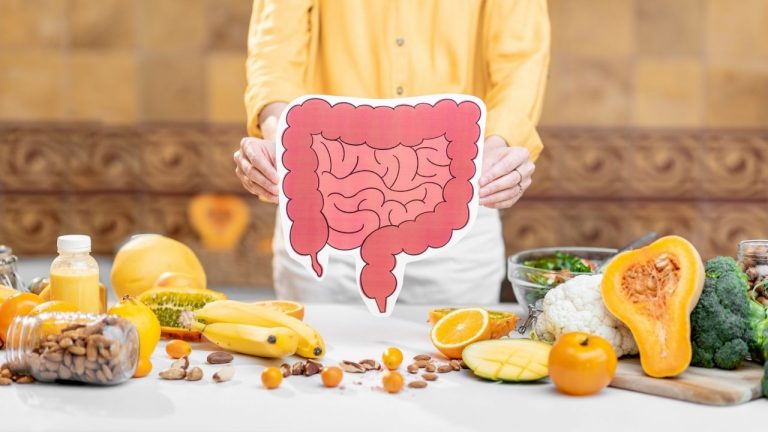Did you know that your gut health is directly related to your overall health? A healthy digestive system is a key to maintaining a healthy body. In this blog post, we will discuss the benefits of good gut health and how you can improve your digestive system!
What is good for gut health?
Most people don’t give much thought to their gut health, but it plays a crucial role in overall health and well-being. The gut is home to billions of digestive enzymes and good bacteria that help break down food, absorb nutrients, and fight harmful bacteria and toxins. When the gut is healthy, it functions optimally, and the body can digest food properly and ward off disease. You can do several things to support gut health, including eating a healthy diet, exercising regularly, and getting enough sleep. Probiotic foods like yogurt and sauerkraut are also beneficial, as they help replenish the good bacteria in the gut. You’ll be doing your whole body a favor by taking care of your gut!

What can affect your digestive system?
Digestion is a complex process involving everything from when you take your first bite of food to when that food is finally eliminated from your body. Along the way, several things can go wrong, leading to digestive problems. For example, gut infections can cause inflammation, while an imbalance of gut bacteria can lead to digestive issues like irritable bowel syndrome. Certain medications can also affect gut health, and emotional stress has been linked to digestive problems like stomach ulcers. In short, several different factors can impact gut health and, as a result, the entire digestive system.

What are the benefits of good gut health?
There are many benefits to having a healthy gut, including improved digestion, better nutrient absorption, and a more muscular immune system. Good gut health has been linked to a reduced risk of chronic diseases like obesity, heart disease, and type II diabetes. So if you’re looking for ways to improve your overall health, start with your gut! Taking care of your digestive system is a vital part of maintaining a healthy body.

How to improve your digestive system
There are a few things you can do to improve your gut health and, by extension, your digestive system. First, eat plenty of fiber-rich foods. This will help keep things moving along smoothly. Second, eat probiotic-rich foods like yogurt and sauerkraut. These contain healthy bacteria that can help balance the gut flora. Third, drink plenty of water. This will keep things hydrated and prevent constipation. Fourth, avoid processed and sugary foods. These can upset the gut and lead to inflammation. You can improve your gut health and enjoy better digestion by following these simple tips.

What are some healthy foods for a healthy stomach and intestines?
Some healthy foods that are good for gut health include yogurt, sauerkraut, kimchi, miso soup, kefir, tempeh, and dark leafy greens. These foods contain probiotics or prebiotics that help replenish the good bacteria in the gut. They also contain fiber which helps keep things moving along smoothly. Additionally, these foods are all low in sugar, which can upset the gut and lead to inflammation. By including these gut-healthy foods in your diet, you can improve your gut health and enjoy better digestion.

What are some unhealthy foods that can cause problems with digestion?
Some unhealthy foods that can cause problems with digestion include processed foods, sugary foods, dairy products, and fatty meats. These foods can upset the gut and lead to inflammation. Additionally, these foods can contribute to constipation or diarrhea. Avoiding these unhealthy foods can improve your gut health and enjoy better digestion.

Frequently Asked Questions
How to increase your good bacteria in the gut naturally?
There are a few things you can do to naturally increase the good bacteria in your gut. First, eat plenty of fiber-rich foods. This will help keep things moving along smoothly. Second, eat probiotic-rich foods like yogurt and sauerkraut. These contain healthy bacteria that can help balance the gut flora. Third, drink plenty of water. This will keep things hydrated and prevent constipation. Fourth, avoid processed and sugary foods. These can upset the gut and lead to inflammation. You can improve your gut health and enjoy better digestion by following these simple tips.
How does stress affect gut health?
Emotional stress has been linked to digestive problems like stomach ulcers. In short, there are a number of different factors that can impact gut health and, as a result, the entire digestive system. When you’re feeling stressed, your body goes into “fight or flight” mode. This causes a release of hormones that can lead to inflammation. Additionally, stress can affect the good bacteria in the gut, leading to an imbalance in the gut flora. This can lead to digestive problems like diarrhea or constipation. You can improve your gut health and enjoy better digestion by managing your stress levels.
What are some other ways to improve gut health?
In addition to eating a healthy diet and managing stress, you can do a few other things to improve gut health. First, exercise regularly. This can help reduce inflammation and promote a healthy digestive system. Second, get enough sleep. This will help the body heal and repair itself. Third, avoid smoking. Smoking can damage the lining of the gut and lead to inflammation.
What are some common gut problems?
Common gut problems include irritable bowel syndrome (IBS), inflammatory bowel disease (IBD), and digestive disorders like gastritis and ulcers. These conditions can cause symptoms like abdominal pain, bloating, diarrhea, constipation, and fatigue. If you’re experiencing any of these symptoms, it’s essential to see a doctor to get a proper diagnosis. By understanding the cause of your gut problems, you can find the best way to treat them and improve your gut health.
What is the best probiotic for gut health?
There are many different probiotics on the market, so it’s hard to say which one is the best. However, some research indicates that certain probiotics may be more effective than others. For example, Lactobacillus acidophilus is a common probiotic that has been shown to improve gut health. Additionally, Bifidobacterium long has also been beneficial for gut health. If you’re looking for a probiotic to improve gut health, it’s essential to speak with a doctor or nutritionist to find the best one for you.
Conclusion
Improving your gut health can have a profound impact on your overall well-being. From boosting your immune system to reducing inflammation, following these tips should help you get started on the path to better gut health. What are you waiting for? Give some of these methods a try and start feeling better today!



